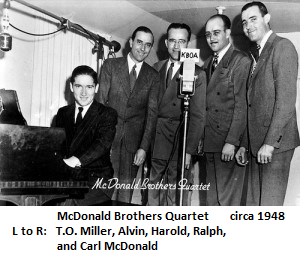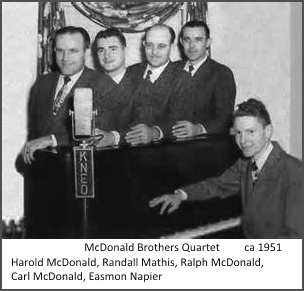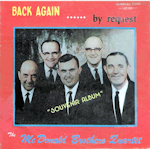 |
Group Members(Incomplete) Tenor |
 |
 |
McDonald Brothers Quartet (1927-1955)
The McDonald Brothers from the Flat River section of southeast Missouri became a professional quartet in the late 1920s. The quartet included brothers Harold (tenor,) Alvin (lead,) and Ralph McDonald (baritone). Another brother named Lovelle sometimes sang the lead part during their early years. The bass part was sung by men other than the brothers until younger brother Carl joined the quartet in the mid-1930s. Harold served as manager and emcee.
This group was one of the few quartets in the 1930s to make a living touring and selling their recordings without the benefit of a firm connection with a music publishing company. Along with their records, they often sold songbooks from three different music publishing companies at their appearances.
During this early period, the McDonald Brothers toured with groups of entertainers from a variety of genres including country and pop music. They typically utilized a pianist who was participating in the tour. The tour covered parts of five states regularly.
The McDonald Brothers recorded dozens of songs in the late 1920s through the early 1930s. In 1928 they were one of the first groups to record "Rocking On The Waves," a favorite of their audiences. The recording was a big seller for the quartet. The Stamps Quartet recorded their first big hit song on a major label with "Give the World A Smile" in October, 1927. The McDonald Quartet recorded it on May, 1928 and used it as their theme song.
Many of the McDonald Brothers recordings from 1927-1930, released as the McDonald Quartette and the McDonald Quartet, were sold under multiple record labels including Gennett, Champion, and Okeh.
During 1927-1928 they also recorded as the Goodman Sacred Singers, the Harris Quartet, the Woodlawn Quartette, the Eva Quartette, the Ellington Sacred Quartette, the Emerson Sacred Quartet, and the Challenge Quartet. When using these pseudonyms they released recordings on several labels including Champion, Challenge, Herwin, and Supertone. As examples, they released recordings on the Champion, Challenge, and Herwin labels as the Goodman Sacred Singers and they released on the Supertone label as the Harris Sacred Singers and the Emerson Sacred Quartet.
They sometimes released recordings using several group names on several different labels for the same songs from a single recording session.
To further complicate an accounting of their recordings, during the early 1930s there there was another "McDonald Quartette" and a "McDonald's Male Quartet," both of which recorded many of the same songs that were recorded by the McDonald Brothers, also on multiple labels.
By 1939 the times had changed, and they had become affiliated with the Stamps-Baxter Music and Printing Company. They were singing out of St. Louis, Missouri and called themselves the Stamps Harmony Quartet. Alvin left the group and Ralph was away for much of the time during 1940. By 1941 they were the McDonald Brothers Stamps-Baxter Quartet.
During the war years, Carl was replaced by Leon Carney, who became a crowd favorite at bass.
In 1946, with Alvin and Carl back in the quartet, they became affiliated with the newly-formed Stamps Quartet Music Company. In 1947 the group moved to the Kennett, Missouri area and began singing on radio station KBOA where they remained until they relocated to Oklahoma in 1950.
By the late fall of 1951, brothers Harold, Alvin, and Carl had left the quartet. Ralph reorganized the quartet in Kennett and became the manager and emcee. During the next few years, they had personnel who were well known (or would be later) including bass singers Gordon Hill and Warren Holmes and pianists Easmon Napier, Charles Cruce and C.B. Kelton.
The brothers returned from time to time as fill-ins. Alvin continued working occasionally as a "front man" to secure venues for them to perform.
The quartet left Kennett before the end of 1951 and relocated to Clinton, Illinois for a while before returning closer to home in Jackson, Tennessee, and later to Blytheville, Arkansas.
At one time their programs were heard over a network of approximately 160 radio stations. They also had a television program in Jackson, Tennessee. Although the quartet was well-received by its audiences, it became increasingly difficult for the group members to make a living. The quartet disbanded in 1955 as one of the oldest and longest-running quartets in gospel music.
The McDonald Brothers Quartet got back together in 1968 for several concert dates, and they recorded their first and only LP titled Back Again by Request. The reunion lineup was composed of brothers Harold, Alvin, Ralph, and Carl McDonald along with Robert Craft at piano and Bill Casolari on the bass viol.
Discography
 hi-res
hi-res1968 Back Again By Request (Custom Records/LP 188): Roll On Jordan; There's A Little Pine Log Cabin; In The Sweet Forever; Echoes From The Burning Bush; Your Life Can Be Beautiful; When I Got Saved; Just A Little Talk With Jesus; I'm Just A Stranger Here; Blue Shadows; We'll Soon Be Done With Troubles And Trials; Gettin' Ready To Leave This World; If We Never Meet Again. (Harold McDonald, Alvin McDonald, Ralph McDonald, Carl McDonald, Robert Craft, Bill Casolari).
